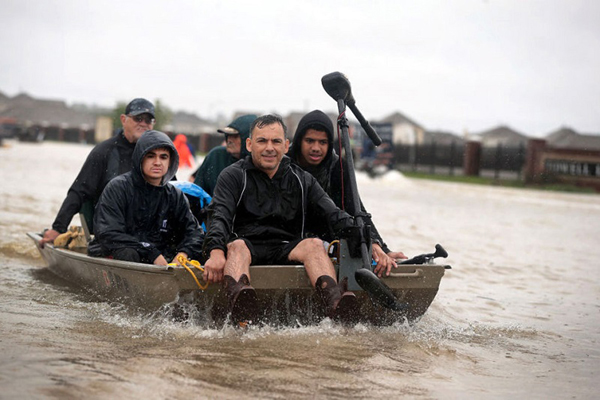- South Texas Students Meet Accordion Music Icons Los Tigres Del Norte In Edinburg Thanks To Khs America/Hohner Alianza Académica Initiative
- Fragile Planet Offers a Nighttime Wildlife Experience
- Falcons Soccer Off & Running
- Cameron County Receives Funds to Improve Two Parks
- Falcons Complete First Half of 32-6A
- School District to Help out Victims of California Wildfires
- Sand Castle Days Continued Despite Unexpected Weather
- Ready for District
- Discussion of Garbage Dumpster Rates, Agreements Between State & City on Highway Regulations, and More
- 31st Annual Shrimp Cook-Off is Right Around the Corner
2017 Coverage of Trump Left Little Room for Climate Change
- Updated: January 5, 2018

Hurricane Harvey dumped an unprecedented 50 inches of rain on parts of southeast Texas, a phenomenon many scientists attribute to climate change. Photo: ScottOlson/GettyImages
by Mark Richardson
DALLAS – This year reporters seemed to focus on President Donald Trump’s every move in the White House. But some wonder if that left other big stories uncovered.
Lisa Hymas, climate and energy program director at Media Matters, a progressive media watchdog group, argues it did, and that climate change is the most important story of 2017 the media failed to cover. She said that’s despite the fact that the United States saw an extraordinary number of devastating weather events this year.
“And they’re just the sort of thing that climate scientists have been telling us that we will see,” Hymas said. “And some media outlets are telling people that, but too many of them are not. They’re not connecting the dots between extreme weather like hurricanes and wildfires and floods to climate science.”
Hymas cited research showing that, during two weeks of hurricane coverage on eight major networks, 60 percent of stories included the word “Trump” and only 5 percent mentioned “climate change.”
Nationwide, 2017 was the most expensive wildfire season in the nation’s history. Hymas said covering climate change can be hard for journalists because it’s a relatively slow-moving phenomenon and often feels like a faraway threat. While climate change may not cause any single hurricane to form or wildfire to break out, she said there is good science that explains the interaction between the two.
She cited a series of papers recently published in the Bulletin of the American Meteorological Society in which researchers around the world analyzed 27 extreme weather events. They found that human-caused climate change drove 21 of those events.
“Climate change does exacerbate events. It makes them more extreme,” Hymas said. “So, I think sometimes journalists shy away from it because the science can be a little bit complicated to explain. But I would encourage the media to talk directly to scientists and let them explain the connections that they’re finding.”
Still, Hymas said she has a rosy outlook for the future of coverage, saying some media outlets did well connecting the dots during events like hurricanes Harvey and Irma. She said she believes media coverage is critical to informing the public’s perspective on climate change.
Hymas’s original story on climate change and the media is online at TheGuardian.com.
